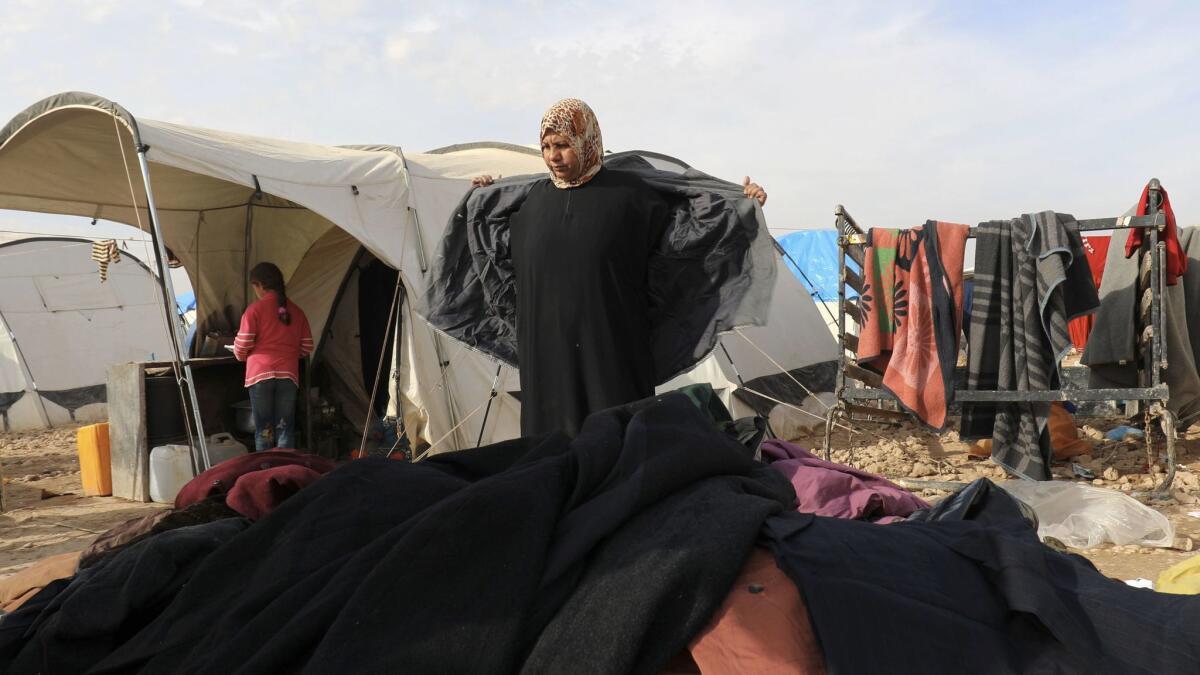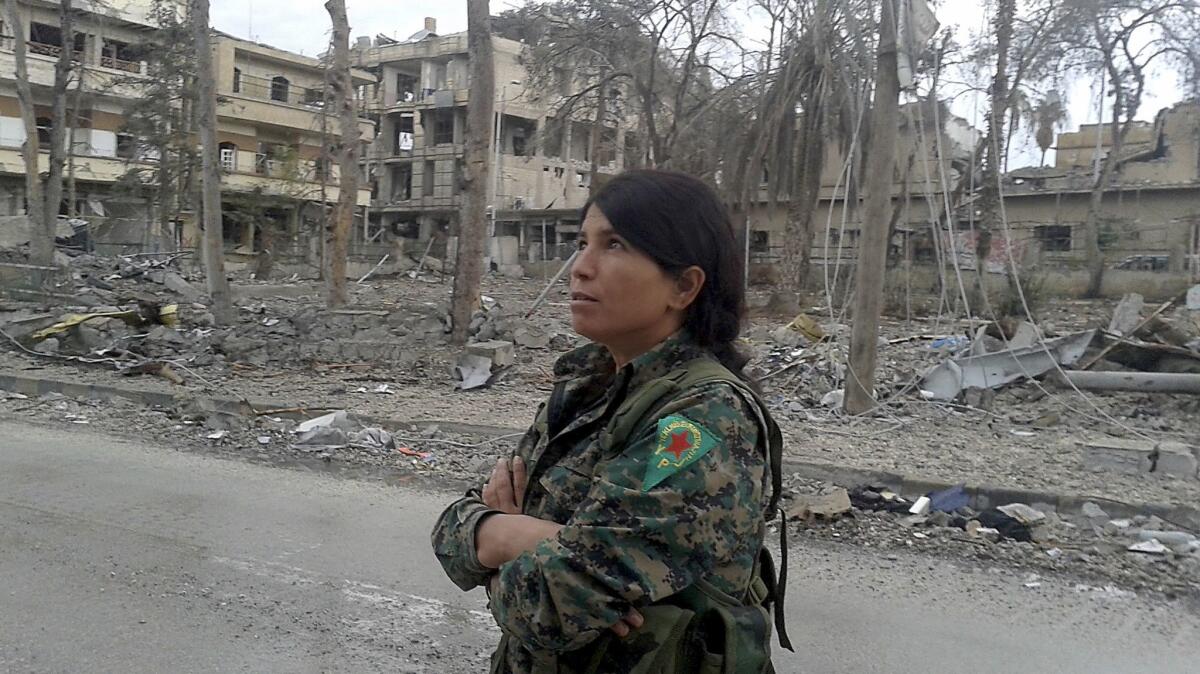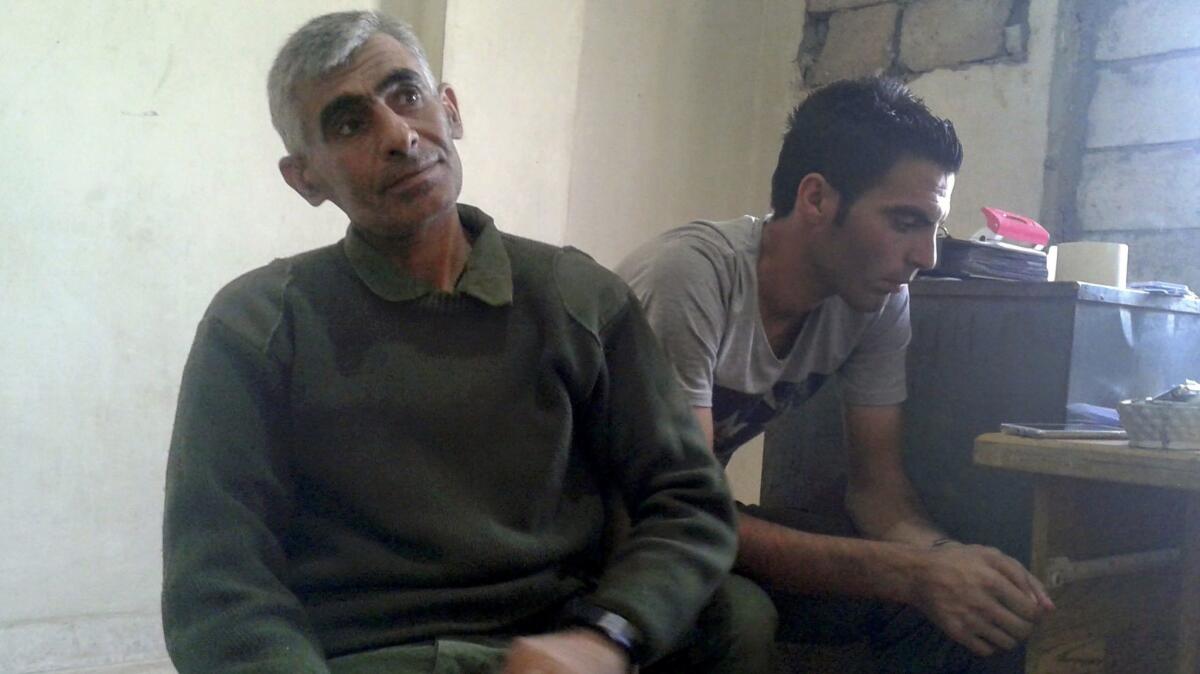Feminism, Syria-style: Conservative tribesmen freed from Islamic State emerge into a world where women have rights

- Share via
Reporting from Arisha, Syria — Ibrahim Habloush is grateful to be here in Ain Issa, one of dozens of wind-swept desert camps set up in northeastern Syria for people displaced by the fight against Islamic State extremists.
It is a safe place for his family of 10 while they wait for their ravaged city of Raqqah to be cleared of explosives and rubble. But the 50-year-old builder does have a complaint.
“They give a lot of rights to women,” he explained. “If I raise my voice at a woman, they might put me in jail.”
He said that when some of the men at the camp complained to authorities, they were told, “We are a democracy here.”
The camps are run by ethnic Kurdish forces who have some distinctly progressive ideas about women. It’s been something of a culture shock for many of the residents who for three years had lived under the crushing religious fundamentalism of Islamic State.
Even before the extremists took over, this part of Syria had been a deeply conservative place, where most women were expected to obey men, marry young and raise children. The militants took repression of women to a new level, requiring them to cover every inch of skin in loose black clothing and not go out in public without a male guardian. Even minor infractions could lead to floggings.
But many of those areas have been liberated by forces affiliated with the Kurdish Democratic Union Party, in whose territory women are guaranteed representation at every political level. Women also serve in militias that have played a central role in the U.S.-backed campaign against Islamic State. And though most Kurds are Muslims, women here are not required to wear the veil, nor are they subjected to any other dress code.
The multiparty campaign to push Islamic State out of Syria and Iraq has resulted in a number of unusual cross-cultural interactions, but few have been as unlikely as those occurring in these camps between highly traditional Arab tribesmen and the leftist revolutionaries who are now in charge.
The party — known by its Kurdish initials, PYD — gets its feminist ideas from Abdullah Ocalan, a Kurdish militant from neighboring Turkey who once wrote, “A people cannot be free if the women are not free.”
In the 1970s, Ocalan co-founded the Marxist-inspired Kurdistan Workers Party with the aim of establishing an independent state for Turkey’s historically marginalized Kurds. The party has waged a violent insurgency for the last three decades, and both Ankara, Turkey, and Washington have branded it a terrorist group, though Ocalan’s followers in Syria are fighting a common enemy in Islamic State.
Captured in 1999, Ocalan is now in prison serving a life sentence for treason. It was there that he discovered the writings of an obscure American political theorist named Murray Bookchin, who seemed to offer a way to achieve autonomy without secession.
The idea was to set up networks of community councils to manage local affairs within existing state boundaries. Ocalan’s version aims to give a voice to the region’s other ethnic and religious groups — Arabs, Turkmens, Assyrians, Christians — and places a heavy emphasis on women’s rights.
Though the organizational links between Ocalan’s group and its Syrian counterpart are disputed, the Syrian Kurds have sought to spread his egalitarian vision in territory they control.
Councils, each led jointly by a man and a woman, administer communities throughout the three Kurdish-majority areas vacated by the central government a year into the rebellion against Syrian President Bashar Assad that began in 2011. The idea is now being applied in Arab-dominated areas that were freed from Islamic State by an alliance of militias led by the party’s armed wing.
Ocalan’s image is ubiquitous across these regions, drawing comparisons to the cult of personality built around Assad. Many of the men who police the camps wear patches adorned with Ocalan’s face, which also looms from billboards, at checkpoints and in government offices.
The camps have been a recruiting ground for the Syrian Democratic Forces, the U.S.-backed alliance of Kurdish and Arab militias that has proved to be one of the most effective fighting forces against Islamic State. That the recruits include women has drawn the ire of some residents.
Habloush didn’t have a problem with that, however. He has a son in the force who provides the family’s only income, about $200 a month. “Maybe some people will not accept that a girl is on the front lines,” he said. “But maybe she can work in an office or in the police force.”

The women who enlist are often driven by a desire to avenge the wrongs done by Islamic State. A 33-year-old Kurdish commander who goes by the nom de guerre Klara Raqqah — for the city where she grew up, which the extremists turned into their capital — recalled that women and girls from Iraq’s Yazidi religious community were brought to Raqqah to be sold as slaves.
“They wanted to return people to the Middle Ages,” she said. “For this reason we said Raqqah should be liberated by the hands of women.”
But for the commander and other women who helped drive the militants from the city in October, the battle for Raqqah was about more than defeating Islamic State. “Our goal was … also to rebuild society into one that respects women and gives them their rights,” she said.
It was a message that resonated with Lalwa Abdullah, a 25-year-old Arab woman who serves in the media department of the Syrian Democratic Forces.
When the uprising against Assad began, she was not permitted to join the demonstrations roiling her eastern city, Dair Alzour. She showed her support by making posters and pamphlets. Now, she says, “I make my own decisions.”
“I feel very proud that I am participating in this force that is going to liberate … my land and my people from Daesh,” she said, using a derisive Arabic acronym for the militants.
Few here expect attitudes to change quickly, though.
“Maybe it will take 20 years to resolve these issues,” said Assad Amuda, a 41-year-old police commander in green fatigues.
Amuda is in charge of security at a camp known as Arisha, where people who fled Dair Alzour and surrounding areas are checked for ties to Islamic State. But he also plays social worker at times, as he considers it part of his mission to improve the lot of women among a mostly conservative Arab population.

Unlike some of his subordinates, when Amuda is on duty, he doesn’t advertise his allegiance to the teachings of a man whom many Arabs regard as a terrorist.
“In my mind, in my soul, I am following the philosophy of Ocalan,” he said. “But if I go to the people with his picture on my arm, they won’t see me, they will see the picture.”
He is more likely to talk about a book that camp residents already know: the Koran.
When a man broke his wife’s nose, Amuda told him that his Muslim faith preaches respect for women and put him in a cell overnight. But he said it was a delicate balancing act.
Attempts by Kurdish officials to promote women’s rights have been a source of friction in the camps, where tempers are fraying over shortages of tents, toilets and other facilities. Too harsh a response might anger the man’s tribe and stir up long-standing ethnic rivalries.
On a recent morning, a young, pregnant mother in an all-enveloping black gown and veil showed up at Amuda’s dingy office. She was distraught because her husband wanted to divorce her and marry another woman.
Amuda summoned the man. When he arrived, he stood to one side and refused to look at his wife, tears running down her face, a toddler squirming in her lap.
Now wasn’t the time to abandon his wife, Amuda told him firmly. Where would she go? There was a war going on, and the family only had one tent.
At the end of what became a four-hour mediation, Amuda had the husband sign a declaration pledging to continue caring for his wife, even though he was engaged to another woman.
Could he still get married? the man wanted to know. Amuda asked why he wanted another wife.
“Because the Koran says I can marry four women,” he said sullenly.
“OK, but you only read part of the Koran,” Amuda said. “The Koran also says you have to treat them all equally.”
“Just build a house for me and my children,” the woman interjected. “Then you can marry who you want.”
The man stormed off, his wife and son trailing behind him.
Special correspondent Kamiran Sadoun contributed to this report.
Twitter: @alexzavis
More to Read
Sign up for Essential California
The most important California stories and recommendations in your inbox every morning.
You may occasionally receive promotional content from the Los Angeles Times.














